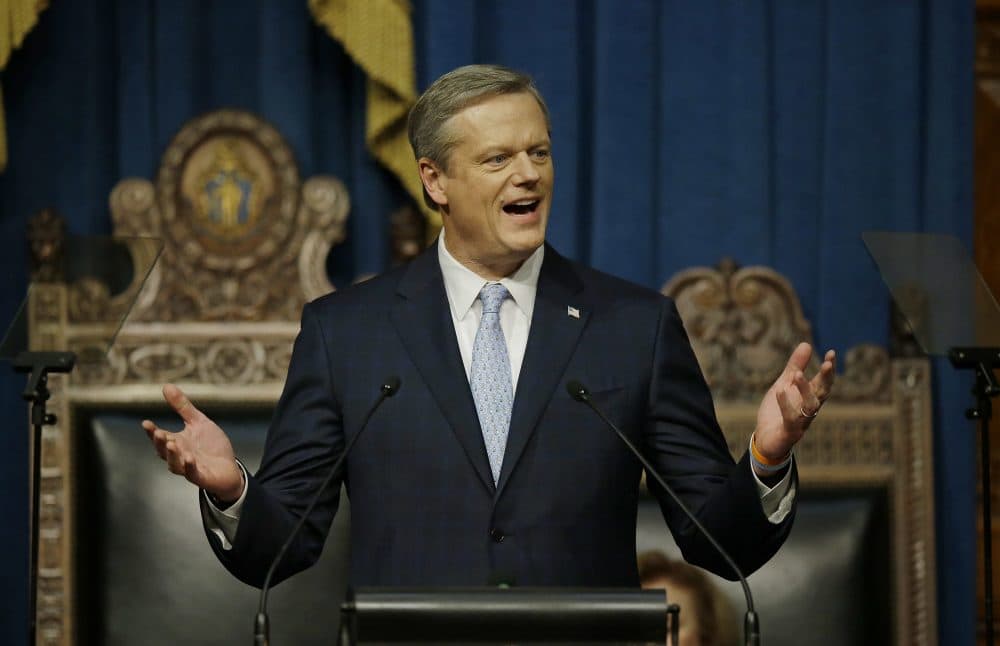Advertisement
Gov. Baker Unveils $40.9 Billion Budget Proposal

Gov. Charlie Baker is proposing a 2.6 percent growth in state spending, filing a $40.905 billion budget for fiscal 2019 Wednesday that calls for changes at MassHealth and a tax on short-term housing rentals.
The budget is built on the expectation that state tax collections will grow at a 3.5 percent clip next fiscal year. This year's budget clocks in at about $39.4 billion.
Baker's budget also anticipates $125 million in large tax-related settlements and judgments, $65 million from corporate dividend repatriation, $63 million in revenues from the marijuana industry, and $13 million from extending the room occupancy tax to short-term rentals made through platforms like Airbnb.
The rental tax is similar to a proposal Baker previously made. It calls for the tax to be applied to operators who rent rooms 150 or more days per year. The Department of Revenue could enter into voluntary agreements with companies like Airbnb, allowing those entities to collect taxes on the state's behalf.
The spending plan uses $95 million in non-recurring revenues, a small amount compared to previous fiscal years, and calls for a transfer of $96 million to the stabilization fund, bringing its balance to $1.4 billion, Administration and Finance Secretary Michael Heffernan said.
MassHealth, the state's largest spending area, would be held to a 0.5 percent net spending growth rate over this year while experiencing an estimated population growth of 1.2 percent, or 22,000 people, Health and Human Services Secretary Marylou Sudders said.
To hold spending growth down, Baker is proposing to transition 140,000 non-disabled adults between 100 percent and 138 percent of the federal poverty line to comparable plans at the Massachusetts Health Connector, similar to a plan lawmakers rejected last year.
Sudders said the administration took feedback from legislators and others into account and revised their proposal so that people who are transferred could receive zero-copay, zero-premium coverage.
To further control costs at MassHealth, the budget contains two outside sections intended to give the state Medicaid program new tools to manage growth in pharmacy spending, including new direct negotiating and transparency approaches, Sudders said.
Advertisement
The administration is already in the thick of another battle on health care. Lawmakers and labor unions are strongly resisting a health care restructuring at the Group Insurance Commission, which covers state employees and retirees, that the GIC says will save about $20 million while holding down out-of-pocket costs for enrollees and continuing to deliver quality health insurance.
On other policy matters, Baker is recommending increasing the state Earned Income Tax Credit from 23 percent to 30 percent of the federal level, reducing the filing fee to create an LLC from $500 to $250, and capping accrued sick time at a maximum of 1,000 hours for executive branch and higher education employees.
The budget includes $149.2 million for the Department of Public Health to fight the opioid epidemic, $12.8 million for the Massachusetts Substance Abuse Center, and $5 million to establish a new Substance Use Prevention, Education, and Screening Trust Fund within the Executive Office of Education.
Baker is proposing about $1.1 billion in unrestricted local aid and $4.865 billion in aid to K-12 schools.
The local aid increase of $37.2 million or 3.5 percent matches up with the expected growth rate in state tax collections.
The $118.6 million boost in education money, a 2.5 percent increase, includes $15 million in additional aid for school districts that have seen an influx in hurricane evacuees from Puerto Rico and the U.S. Virgin Island and $24.3 million toward addressing rising costs of health care for retirees, a sum Baker has characterized as a "significant investment."
Elsewhere in education, Baker said in his State of the State speech that he is calling for a more than $7 million increase in college scholarship funding to cover the remaining tuition and fees of community college students with unmet financial needs after receiving other state and federal financial aid.
Baker is proposing a 1 percent increase in state funding to the University of Massachusetts, state universities and community colleges.
The budget also provides an additional $2 million to support cities and towns in their climate adaptation planning and to accelerate statewide hazard mitigation planning, and $84 million for a redesign of adult community-based mental health services at the Department of Mental Health.
The next stop for Baker's budget is the House Ways and Means Committee, which will hold public hearings and release its spending plan, likely in April.